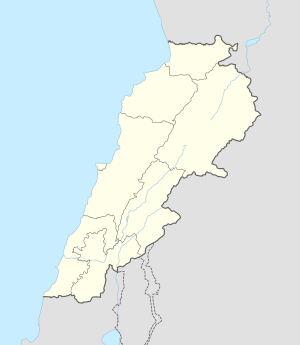| This article needs additional citations for verification. Please help improve this article by adding citations to reliable sources. Unsourced material may be challenged and removed. Find sources: "Al-Ghassaniyah, Sidon" – news · newspapers · books · scholar · JSTOR (August 2012) (Learn how and when to remove this message) |
| Al-Ghassaniyah الغسانيةGhassanieh | |
|---|---|
| Municipality | |
 | |
| Coordinates: 33°25′03″N 35°21′30″E / 33.4176°N 35.3584°E / 33.4176; 35.3584 | |
| Grid position | 117/164 L |
| Country | |
| Governorate | South Governorate |
| District | Sidon District |
| Elevation | 1,300 ft (400 m) |
| Time zone | UTC+2 (EET) |
| • Summer (DST) | UTC+3 (EEST) |
| Area code | 07 |
Al-Ghassaniyah (الغسانية) is a municipality in southern Lebanon with a population of about 8000 . It is 14 kilometres southeast of Sidon, bordered by Kawatria Al Sayyad to the east, Al Babebliah to the west, Kakyiat Sanawbar to the northwest, and Khartoum to the southeast. The name of the town, Al-Ghassaniyah, is derived from the clan of Alghassasina.
Economy
The town of Al-Ghassaniyah was originally an industrial town, manufacturing brooms and brushes for the Lebanese market. Immigration started in the 19th century and intensified during World War I, with a group of young men emigrating to Latin America to escape conscription in the Ottoman empire army.
This emigration continued through the 20th century and again intensified during the 1940s and 1950s, this time to West Africa, where the immigrants engaged in trade and industry.
In a second wave of immigration, many returned to Lebanon, some temporarily and some permanently, to join the booming construction business. Al-Ghassaniyah companies were involved in commercial and residential construction in Beirut and its suburbs for more than 60 years.
The third wave of emigration was focussed mainly on education in Europe, Canada, and the US. Today, a large group of engineers, medical doctors, and management professionals in ISO and other international standards are involved in spreading a culture of knowledge and continuous development.
Others were involved in international investments and are still residents or citizens around the world in: Argentina, Brazil, USA, Canada, Australia, France, UK, Switzerland, Netherland, Sweden, Germany, Belgium, Liberia, Ivory Coast, Ghana, Nigeria, Angola, Namibia, Qatar, UAE, KSA, Syria, Egypt, Jordan, Iraq, Iran, Turkey, Somalia, Djibouti, Senegal, Benin, Sudan, South Africa, Zambia, Zimbabwe, Guinea, Siraleone and many others.
Al-Ghassaniyah became a global village as a result of its ambitions to grow and develop its way of life. The people of Ghassanieh cross all barriers in pursuit of their dreams and return to their village to build and develop it.
Modern era
On 7 August 2006, during the 2006 Lebanon War, Israeli war planes killed seven people in the village.
Demographics
In 2014, Muslims made up 99.26% of registered voters in Al-Ghassaniyah. 98.18% of the voters were Shiite Muslims.
References
- HRW, 2007, pp. 132-133
- "التوزيع حسب المذاهب للناخبين/ناخبات في بلدة الغسانيه، قضاء صيدا (قرى) محافظة الجنوب في لبنان". إعْرَفْ لبنان.
Bibliography
- HRW (2007). Why They Died: Civilian Casualties in Lebanon During the 2006 War. Human Rights Watch.
External links
- Ghassaniyeh, Localiban
- https://web.archive.org/web/20080724175419/http://www.lebanonatlas.com/lebanonmajorcities/South/Ghassanieh/index.htm
- http://wikimapia.org/4202286/ar/al-ghassanieh-%D8%A7%D9%84%D8%BA%D8%B3%D8%A7%D9%86%D9%8A%D8%A9
This Lebanon location article is a stub. You can help Misplaced Pages by expanding it. |
